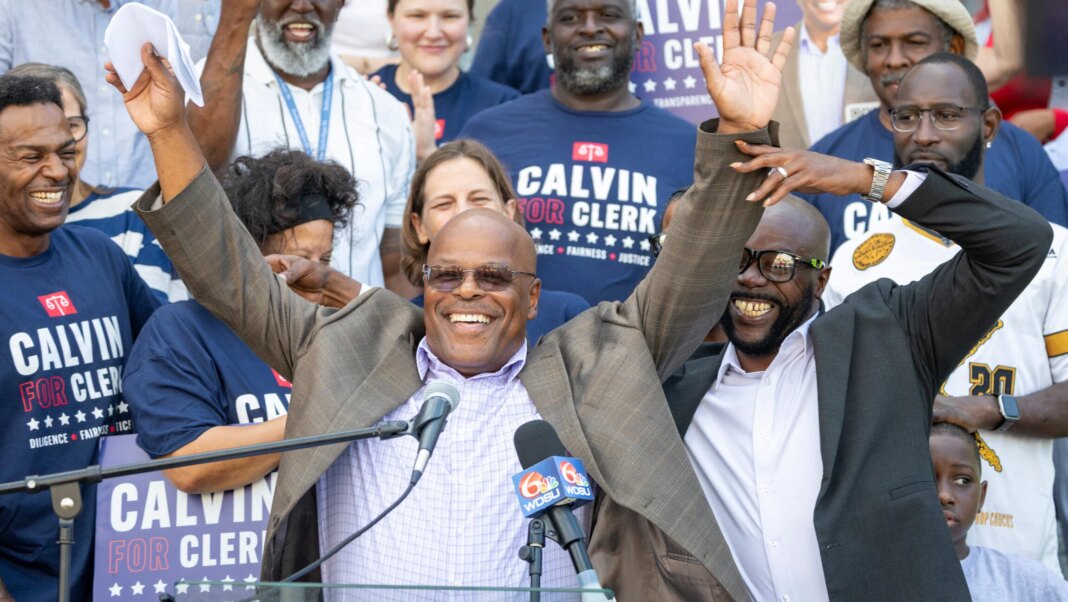A Controversial Race for New Orleans Clerk of Criminal Court
The race for New Orleans Clerk of Criminal Court has taken an unexpected turn, centered around Calvin Duncan, a candidate with a past that has attracted both fervent support and sharp criticism. Duncan, who spent three decades in prison for a murder conviction that was ultimately vacated, is now facing attacks questioning the legitimacy of his exoneration, particularly from Louisiana’s Attorney General Liz Murrill and the current clerk, Darren Lombard.
The Personal Stakes for Duncan
At 62 years old, Duncan has transformed his life story—from an inmate to a candidate for a critical civic position. While incarcerated for a murder he did not commit, Duncan taught himself law and faced multiple challenges while trying to access his legal records. His journey, which included significant hardships, gives him a deeply personal motivation to hold the position of recordkeeper for criminal cases in New Orleans.
“I don’t never want to have what happened to me happen to nobody else,” Duncan stated passionately, emphasizing his commitment to ensuring that others do not suffer from misjudgment like he did. His narrative is not just about seeking office; it’s about justice and rectifying past wrongs in a system that often feels unforgiving.
The Question of Exoneration
Duncan’s campaign has sparked intense debate over the terminology used regarding his case. While he identifies as exonerated—citing the 2021 vacating of his murder conviction due to new evidence of his innocence—his opponents have been less charitable. Murrill and Lombard argue that Duncan’s guilty plea to lesser charges in 2011 undermines his claim to full exoneration. They assert that the label of “murderer” still applies to him, despite the compelling evidence he presented that ultimately led to the conviction’s annulment.
This ongoing dispute has transformed a typically quiet municipal race into a battleground of words, where the implications of exoneration carry significant weight in the eyes of the voters set to head to the polls on Saturday.
Support from Legal Advocates
Jessica Paredes, executive director of the National Registry of Exonerations, stands firmly in support of Duncan. She asserts that his case qualifies for inclusion among over 3,700 documented exonerations since 1989. “We err conservatively to maintain the integrity of the database,” Paredes explained. “Calvin’s exoneration was not one of these close calls. His case clearly meets our inclusion criteria.” This backing from legal experts lends further credence to Duncan’s claims, countering the narrative pushed by his opponents.
Legal Background and Community Impact
Duncan’s legal journey began long before he decided to run for office. Throughout his years in prison, he became a self-taught legal expert, driven by a thirst for justice both for himself and for his fellow inmates. The lessons he learned culminated in a landmark 2020 U.S. Supreme Court decision that abolished non-unanimous jury convictions—a practice rooted in historical racial discrimination.
Transitioning his expertise to the public sphere, Duncan is vocal about the inadequacies within the New Orleans criminal court system. He highlighted ongoing challenges, such as the often cumbersome process of obtaining legal documents, a legacy of the devastating effects of Hurricane Katrina, which claimed thousands of criminal court records. Recently, the clerk’s office even had to salvage valuable documents from a landfill after they were mistakenly discarded.
A Contest of Qualifications
As the election day approaches, the contest between Duncan and Lombard has intensified. Lombard, the incumbent, has disparaged Duncan’s qualifications, claiming he isn’t fit to serve in this critical role. In contrast, Duncan argues that his experiences in both the legal system and the court’s inefficiencies uniquely position him to significantly improve operations within the office.
“I’ve seen and experienced firsthand when a clerk’s office does not function properly,” he asserts, constructing a case for why he understands the weight of the office better than anyone else.
Political Drama in a Local Context
Duncan’s campaign unfolds against a backdrop of broader political drama in New Orleans, where multiple candidates are vying to replace the term-limited Mayor LaToya Cantrell. With a historical moment such as this, the stakes are high, and the attention on Duncan’s candidacy captures not just local interest but also reflects a critical dialogue about justice, redemption, and integrity within the Louisiana legal landscape.
In this charged atmosphere, the narrative surrounding Duncan’s candidacy continues to evolve, as does the ongoing conversation about what it truly means to be exonerated.



